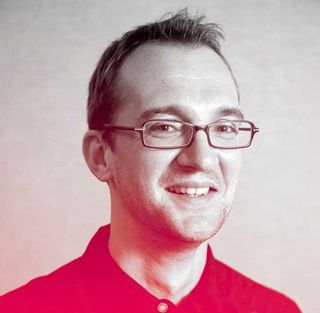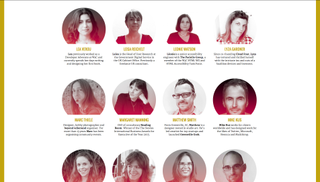Why diversity matters in the web design industry
Editor of net magazine Oliver Lindberg weighs in on the thorny issue of gender balance in the web community.

There's one topic in the tech industry that comes around every so often, gets everyone up in arms and then disappears again for a while. For the most part, we have tended to just observe it and do what we consider to be right, but it's time to speak up: diversity matters.
net magazine is committed to reflecting a fair gender balance in everything we do. According to our last reader survey, 16 per cent of our readers are female and so a lot of our contributors are female, there are plenty of women speaking at our Generate New York conference and just under a third of our 100 net awards judges are female.
This doesn't go unnoticed:
But how do we do it? Have we got a quota? No. We don't sit there with a pocket calculator figuring out if we've reached a quota of 20 or 25 per cent female contributors in an issue of net.
For us it's all about the content. We put a lot of work into sourcing, uncovering and commissioning new talent, particularly from minority groups in the industry. So if you have a good idea for an article and can string a sentence together in English, drop us a line at netmag@futurenet.com - no matter your position, age, gender or background. Don't be shy, get in touch.
Fostering new talent
Just going for the same old faces is lazy. You can't do it without them, because there's a reason they have become so prominent, but you also have a responsibility as an industry publication to foster new talent, put together a roster of contributors with a representative gender ratio and give everyone an equal chance.

Sadly, this isn't the case everywhere. Major conferences still launch line-ups where diversity seems to be an afterthought. This is simply not good enough.
Get the Creative Bloq Newsletter
Daily design news, reviews, how-tos and more, as picked by the editors.
So, we do our bit. Why do we still get tweets like this one when we reveal the nominees for the net awards then?
The awards longlist
The net awards longlist is based on nominations from the public and that phase was open from 3 December to 9 January. This year, we received a record-breaking 2,011 nominations and the net editorial team reviewed every single one of them.
Sadly, when it came to putting together the longlist, some categories ended up featuring an all-male line-up (eg Young Developer the Year and Best Online Portfolio, while others just included one or two women. How did it come to that?
Need for nominations
The truth of the matter is that we didn't receive as many nominations for women (or other minority groups) as we would have liked to see. As explained before, content comes first for us, so we couldn't just include people whose visible work wasn't as good as the other contenders in a given category.
We worked hard to uncover a more diverse line-up and took action to increase the number of female nominees. We got in touch with some fantastic people (and some got in touch with us) to address the issues and help source more diverse nominations, specifically in categories that were particularly lacking in diversity (eg Emerging Talent).
But nominators obviously struggled to name suitable candidates - as highlighted in tweets like this and this - and one of the reasons is that it's because it's symptomatic of the industry:
It's also worth pointing out, however, that although at last year's awards the balance was pretty similar (see Young Developers, Young Designers and Brilliant newcomers), three out of five 'people' categories were won by women in the end (see Previous Winners).
The real question here is why so few women enter the industry (and why so many are leaving). We all need to do more to ensure that everyone who wants to be in our industry has an opportunity to do so. Equal opportunity matters, and as long as we don't have that, we won't achieve real diversity.
It's not just about gender
Diversity is about much more than 'just' gender, however. We aim to have contributors, speakers and nominees from all over the world (last year people from different parts of the US, Canada, Japan, Spain, and the Czech Republic attended the net awards ceremony), accessibility, user experience and inclusive design are important to us and we address topics such as sexism in the industry as well as mental health (Christopher Murphy is nominated for his Outstanding Contribution in raising the issue of mental health in the technology sector).
A diverse age range is also important, of course, and that's why we introduced categories like 'Emerging Talent' (for the under 20s) and 'Young Developer' and 'Young Designer' (for the under 25s), because those people would find it hard otherwise to compete with prominent people in one big 'Designer of the Year' category.
We actively support initiatives like Code Club, Young Rewired State, Girl Develop It and Ladies in Tech and encourage them to help us spread the word about the net awards, specifically our new talent categories, next year. These organisations and similar ones can help us achieve a more diverse line-up, but we need to actively go out to them. We improve our process every time and 2015 won't be an exception.
Diversity matters. And you can help. Next time, cast your net awards nominations with diversity in mind and encourage your network to do the same. If you have an idea of how to make the awards even better, let us know at netmag@futurenet.com. We welcome your input!
This article was originally published in January 2014

Thank you for reading 5 articles this month* Join now for unlimited access
Enjoy your first month for just £1 / $1 / €1
*Read 5 free articles per month without a subscription

Join now for unlimited access
Try first month for just £1 / $1 / €1

Oliver is an independent editor, content consultant and founder of Pixel Pioneers. Formerly the editor of net magazine, he has been involved with the web design and development industry for more than a decade and helps businesses across the world create content that connects with their customers. He is passionate about content, user experience, accessibility and designing for social good.